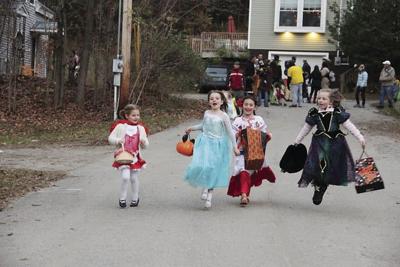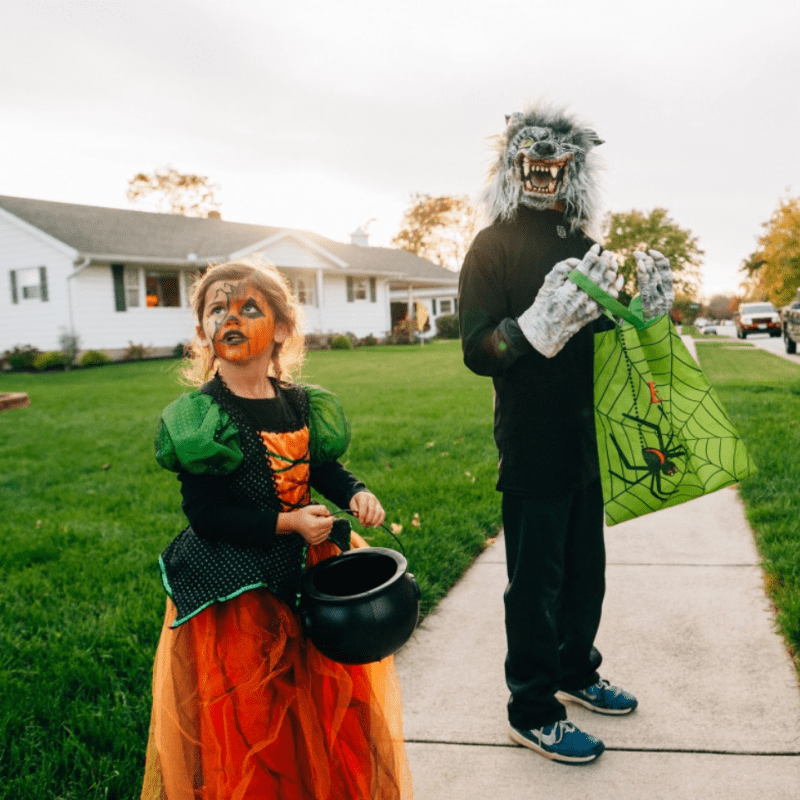Top health leaders are encouraging families to get outside and trick-or-treat for the first time since the pandemic began, but advocates are urging them not to ignore another public health threat that threatens kids every Halloween: traffic violence.
Centers for Disease Control Director Rochelle Walensky grabbed headlines earlier this week when she encouraged families to "‘put on those costumes, stay outside and enjoy your trick-or-treating," albeit with appropriate coronavirus precautions like social distancing. The CDC has in the past been vocal about the public health crisis of pedestrian deaths, but Walensky didn't mention the dangerous, car-saturated roads that many little ghouls will face this weekend — or how little communities are doing to protect them.
As Streetsblog has covered year after year, All Hallow's Eve is the single most deadly day of the year for the littlest pedestrians, with drivers claiming the lives of three times as many young road users than any other date.
But despite these troubling stats, it's also a perennial excuse for government officials to warn families to keep themselves safe on the streets — without doing much to make those streets safer.
Here's just a small sample of some of the worst of what state and local leaders are putting out this year:
This Halloween, have fun AND be safe. stay on the sidewalk and off the road when going house to house. If there are no sidewalks, walk facing traffic and as far to the side as possible. pic.twitter.com/P1m9iugAxF
— Montgomery County Office of Public Health (@MontcoHealthPA) October 28, 2021
Whether you are dashing knight, a moon princess or even a purrfect witch, you need to stay safe this Halloween! And we got some great safety tips for drivers and trick-or-treaters in our blog!
— Kansas Department of Transportation (@KDOTHQ) October 28, 2021
Click here: https://t.co/PXvTmjEqzF#halloween #SpoopySeason #Safetytips #Besafe pic.twitter.com/UPJbphSVNb
When trick-or-treating this week or weekend, stay safe! Avoid walking in the street and please use the sidewalks. pic.twitter.com/qMPGGnzf8q
— Myrtle Beach Police (@MBPDSC) October 25, 2021
So what can cities who want to make their streets a little less scary this Halloween? Here are four ideas that communities across America have already tried.
1. Trick-or-Open-Streets

Cities across America were introduced to the "open street" during the COVID-19 pandemic, which closed neighborhood streets to cars and opened up a world of stress-free socializing, shopping, exercise and fun to quarantined residents looking for a socially-distanced space to get outdoors.
Now, many of them are bringing the concept back for the holidays, including Seattle, Wash., which has made requesting a Halloween "Healthy Street" permit easier than ever.
And they'd be wise to consider keeping most cars out of areas where children walk most long after the moon sets on the spookiest night of the year — starting with the streets outside schools. The United Kingdom's "School Streets" program provides a great example of how it can be done, including occasional exemptions for people with mobility challenges.
2. Put roads on a diet before giving out candy
Kids in costumes may be descending on American blocks as soon as sunset tonight, but it's not too late to make their streets a little less spooky-fast, even if a full-on street closure isn't in the cards.
This cheap and festive pumpkin-protected bike lane piloted in Durham could easily be adapted to extend the sidewalk a little bit for trick-or-treaters on two feet rather than two wheels, or used to outline a bulb-out to shorten the distance a kiddo has to cross.
And if you're not a decorative gourd kind of person, why not take advantage of the plethora of terrifying lawn decorations on offer to do make your creative traffic calming your own? Just saying: we'd happily write an article in tribute to anyone with the chutzpah to stick this thing on a chicane.
3. Repurpose a petrifying parking lot
Don't get us wrong: we're not knocking any parents or caregivers who feel safer taking their kids to the lot behind the local high school than braving the high-speed roads near their homes on Halloween.
But for parents seeking a multimodal alternative to the standard suburban candy grab in a mall garage, why not turn that lot into something even cooler: a traffic garden where kids can be empowered to enjoy biking, walking and rolling without having to road-test their skills right away.
A bike shop in Arlington, Va. did just that for last Halloween last year, and we'd love to see an even more spooktacular version pop up in your town. We can think of a few ghoulish things that would look great in the middle of that chalk traffic circle...
4. Get the message straight
If even simple, inexpensive traffic-calming solutions are outside of a community's reach, the absolute least transportation leaders can do is direct their messaging at the people actually responsible for the Halloween traffic violence surge: drivers, road designers, and the other adults who are supposed to be in charge.
Here are a few examples of PSAs that we can actually get behind.
Halloween🎃 is the deadliest day of the year for children on foot.
— NACTO (@NACTO) October 29, 2019
Why? @JAMA_current study says:
👉 Not enough sidewalks
👉 Unsafe street crossings
👉 Excessive speed + SUVs
Our streets *should* be for Halloween. Let's work to make them safe.https://t.co/KI43ENm21D
As the #Halloween weekend approaches, here's a gentle reminder to be safe out there and take public transit! #publictransit #travelsafe #safetyfirst pic.twitter.com/WsLx35CaKn
— Franklin Transit (@FranklinTransit) October 28, 2021
Happening now! We're partnering with @MelbourneFL Play Melbourne to participate in the annual Boo Drive! Captain Vision Zero is here to hand our Halloween safety goodies. 👻🎃🧙♀️ #PedestrianSafetyMonth #VisionZeroBeginsWithYou pic.twitter.com/igbBnHvAC1
— Space Coast TPO (@SpaceCoastTPO) October 23, 2021






